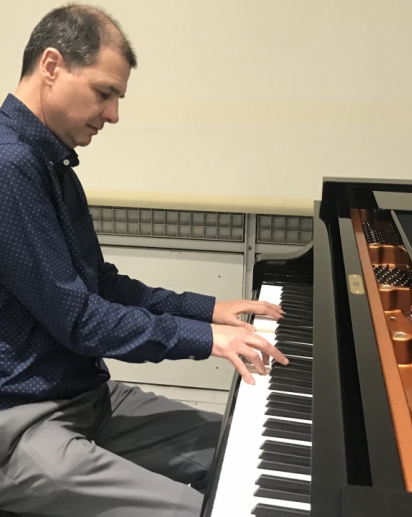ECE Seminar Colloquium
L'objet sonore: auditory and musical invariants in neural representations
Michael Casey, Professor of Music and a Professor of Computer Science at Dartmouth College
Friday, October 21, 2022
12:30 p.m.–1:30 p.m.
GOERGEN 109
 Abstract: Music understanding requires tracking invariant auditory objects and sequences under transformations. Low-level auditory invariants enable perception of stable auditory objects, such that two different notes on a piano are perceived as belonging to the same source. High-level, or music, invariants allow a melody to be identified, even when it is transposed in pitch, stretched or warped in time, played softly or loudly, and when mapped onto a different scale or rhythmic groove. I will present neural evidence that supports the existence of invariants in the human brain, for perceived and imagined music, and discuss how such representational strategies can be recruited to improve future machine listening systems.
Abstract: Music understanding requires tracking invariant auditory objects and sequences under transformations. Low-level auditory invariants enable perception of stable auditory objects, such that two different notes on a piano are perceived as belonging to the same source. High-level, or music, invariants allow a melody to be identified, even when it is transposed in pitch, stretched or warped in time, played softly or loudly, and when mapped onto a different scale or rhythmic groove. I will present neural evidence that supports the existence of invariants in the human brain, for perceived and imagined music, and discuss how such representational strategies can be recruited to improve future machine listening systems.
Biography: Michael Casey is a Professor of Music and a Professor of Computer Science at Dartmouth College, where he is also affiliate faculty in Cognitive Science. He undertook his bachelor's and master's degrees in music composition, and received his doctorate from the MIT Media Lab. His current research seeks to understand the features of sound and music that yield positive, measurable medical benefits, especially for brain diseases such as epilepsy and mental illness. Fusing neuroscience, music theory, and computation, he is working to develop new non-invasive treatments using specifically-designed music. His research is published in the Journal of Cognitive Neuroscience, Proceedings of the National Academy of Sciences, and Scientific Reports, among other leading journals and he has received funding from the National Science Foundation (NSF), the Mellon Foundation, the National Endowment for the Humanities (NEH), the Neukom Institute for Computational Science, Google Inc., Yahoo Inc., and the Engineering and Physical Sciences Research Council (EPSRC, UK).
